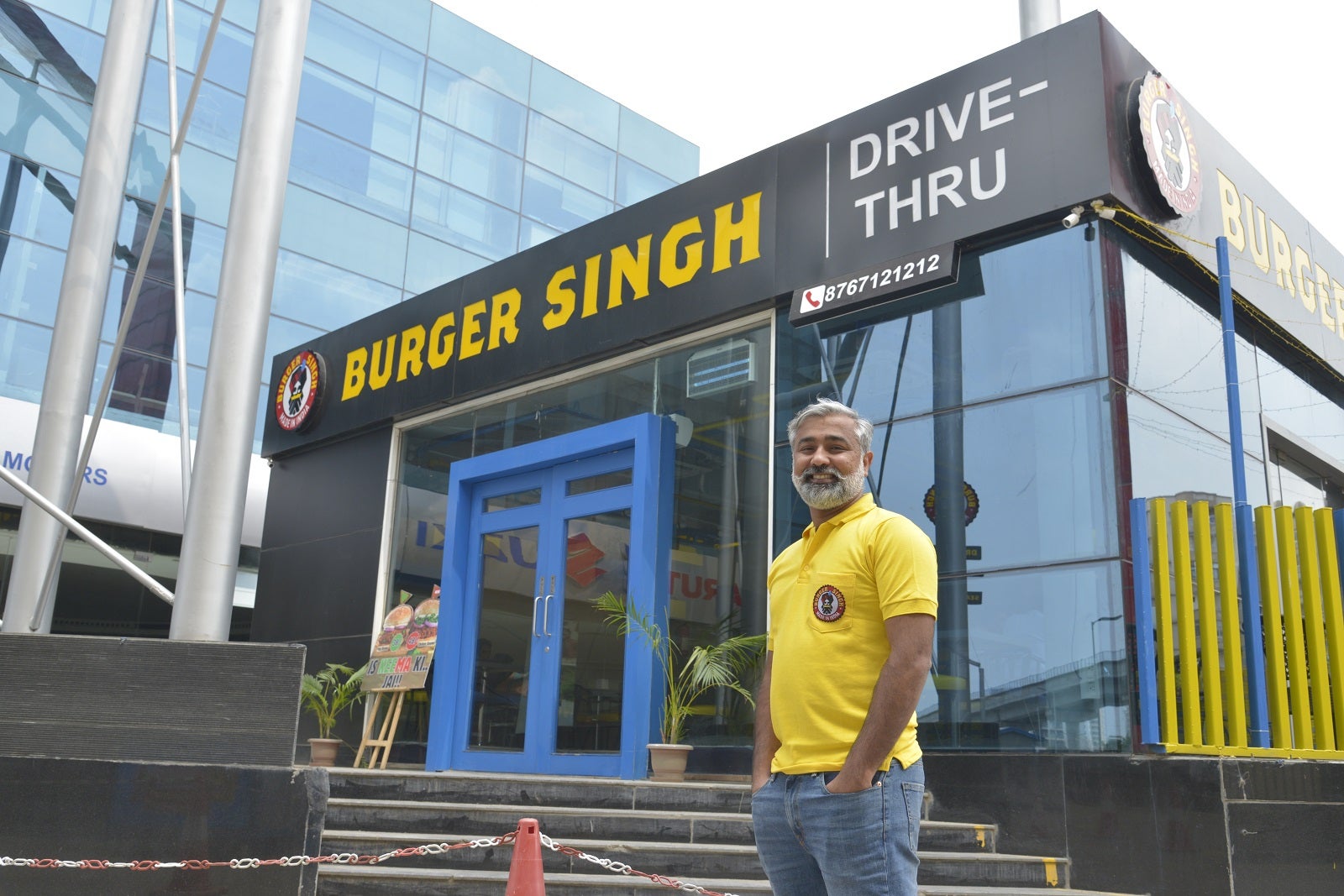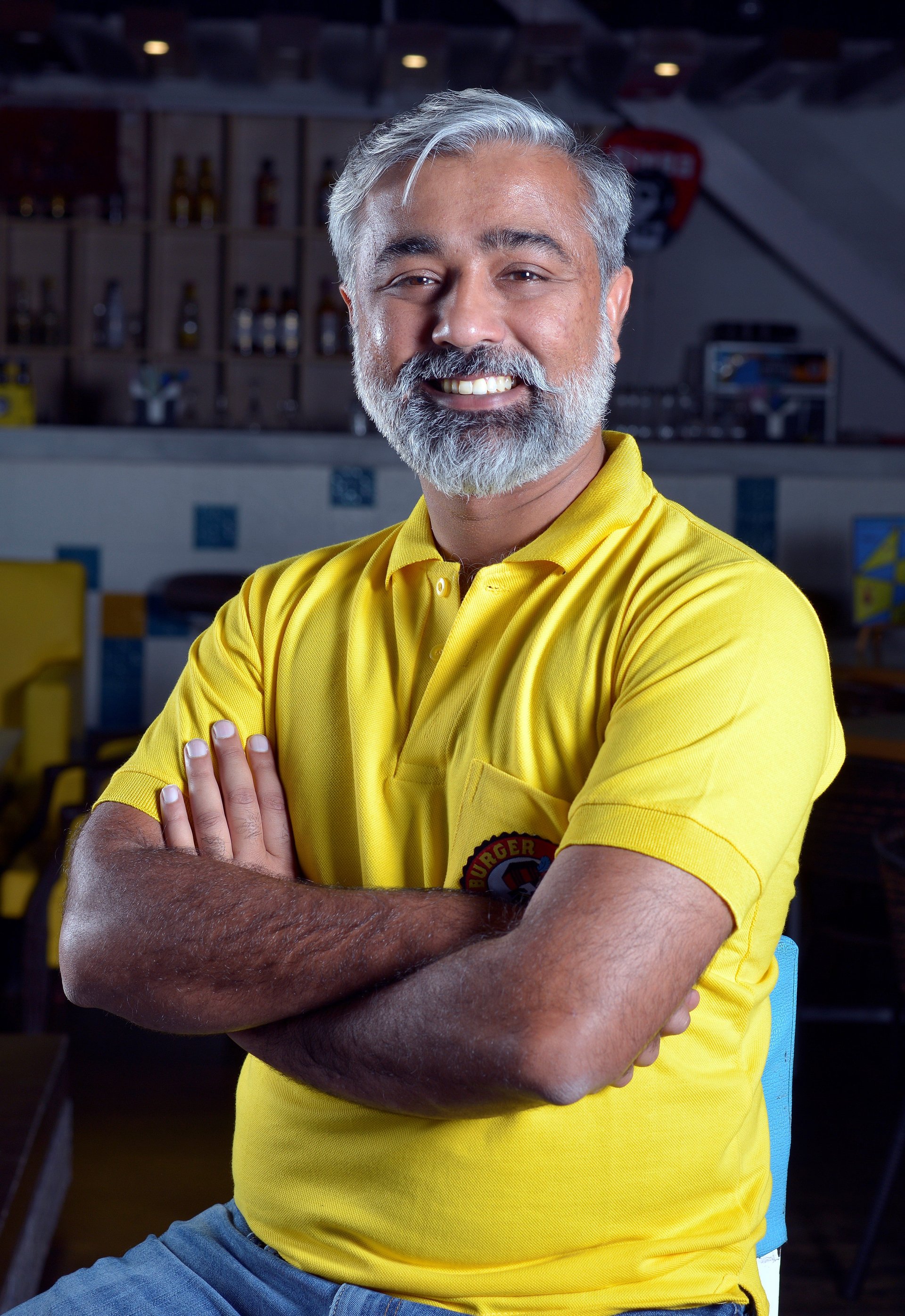This homegrown brand is proving that Singh is king in India’s fast food scene
Indian fast food chain Burger Singh is dreaming big.


Indian fast food chain Burger Singh is dreaming big.
The quick service restaurant (QSR), popular for its desi fusion burgers, is looking to build a pan-India presence with more stores in tier 2 and tier 3 cities over the next two years.
The Gurugram-based chain is led by CEO and co-founder Kabir Jeet Singh. While pursuing his MBA from Birmingham Business School in 2007, Singh worked part-time at a burger outlet, where he experimented by using spices in burgers and patties. Consumers loved the “desi tadka,” which earned him the moniker “Burger Singh.”
He used the name for his own fast food chain while starting up in 2014 with a small, 98 square feet outlet at Golf Course Road, Gurugram. Burger Singh now operates over 35 outlets across cities like Delhi, Noida, Jaipur, Nagpur, Hyderabad, and Bengaluru.
In financial year 2019, the chain reported a revenue of Rs26 crore ($3.90 million). The company did not share revenue estimates for the current financial year.
“Competing with big players such as McDonalds’s, Pizza Hut, and others has not been easy. These players have a strong operational history. However, from the beginning, we have been focusing on delivering distinct yet consistent products. We carry out extensive trials within the company and outside, to test-market our offerings before launching them,” said Singh.
In an interview with Quartz, the entrepreneur talked about surviving competition from big American brands, growth opportunities offered by smaller cities in India, and the company’s continuous struggle to retain talent. Edited excerpts:
How has Burger Singh survived in a market dominated by big brands like McDonald’s, Domino’s Pizza, and Pizza Hut?
We are a young brand. In our initial years, we focused on Gurugram, and Delhi NCR (national capital region). We spent the first one to two years understanding the business, learning about the product (burgers) and observing how our competitors run their business. American brand McDonald’s, for example, is 100 years old. Then there are other younger, but strong, ones like Pizza Hut and Domino’s Pizza. US brands have deep pockets.
We took time to establish ourselves. The focus has always been on getting the product right. Unlike a biryani, a burger is not a localised product. It is a standardised product, yet there is a lot of scope for innovation. We took our time to get all the processes right and ensure that we have a good, consistent product.
Tell us about Burger Singh’s expansion plans?
We are going to open 16 more outlets in the next 24 months. For us, potential markets for expansion are big cities such as Hyderabad, Bengaluru, Ahmedabad, and Chennai, where we already have a presence. We are also focused on tier 3 markets including cities such as Indore, Bhopal, Jhansi, and Gwalior. We are moving from north India to the south, capitalising on our existing supply chain.
How do you identify and evaluate a potential growth market?
With data boom, it is easy to assess the market potential of a place where one wants to open a store. With the presence of food aggregators like Swiggy and Zomato, one can easily pinpoint the number and the type of restaurants that are available in a location. We also get socio-economic data about population from marketing firm Nielsen, which helps us evaluate and decide the markets that we want to enter.
What is the investment that the company has earmarked for expansion?
We have raised funds worth Rs42 crore till date. For our expansion, another Rs40-50 crore should be enough. This amount would take care of our working capital and capital expenditure needs.
Are you going to set up company-owned outlets or opt for franchisee model?
We are looking at both options. In most markets, Burger Singh’s existing franchisee partners have established second and third outlets as well. This shows they are doing well in their respective markets. So, wherever we have an option of going with a franchisee, we do that. We open stores ourselves in markets where we do not have a franchisee.
In Hyderabad and Bengaluru, the company did not have a franchisee, so we went ahead and opened stores ourselves.
How does Burger Singh ensure that quality standards are met by franchisee outlets?
Consumers going to a Burger Singh outlet won’t be able to guess if it’s a company- or franchisee-owned store. Branding, service experience, and quality delivered is consistent across outlets.

Burgers are one of the most franchised products worldwide. It is easy to standardise a burger. To do so, one has to put in place a standard supply chain, operating systems, and day-to-day processes.
You try standardising biryani and you will fail miserably. You cannot really control the kind of rice used for preparing the dish. In the case of a burger, keeping a tab on quality of ingredients being used is easier. For example, bread and sausages are our own. So, the chances of quality standards going down are less.
How different are tier 1, tier 2, and tier 3 markets in terms of business?
Absolute value of profits will differ in tier 1, tier 2, tier 3 markets. These figures depend on account of varying store rentals, etc. Having said that, there is not much difference in the kind of sales that an outlet does in a metro versus a store in a tier 2 city like Jaipur. Our Delhi store, on an average, clocks sales of Rs16 lakh per month and a store in Jaipur would do sales between Rs11-14 lakh a month.
However, the difference is in the market size of a tier 1 and tier 2 city. For instance, a market like Delhi can house 35 to 40 outlets. But a small city like Jaipur can have five to six outlets in a given radius. There is no point populating a territory if there is not enough demand to support four to five franchisee outlets, because, that way, nobody makes money.
What is the biggest challenge you face?
The attrition rates in our business are high. If a competitor gives a worker an additional Rs1,500, she crosses over. We are working around this challenge by offering employees incentives, not only in cash but also in terms of a good working environment. Hiring in small batches, the company invests in an employee by training and equipping her with new skills.
Incentives are not just based on sales. We evaluate staff on multiple parameters. Burger Singh looks at operational efficiencies, product rating, consumer experience, attendance rate, punctuality, and hygiene standards of an employee.